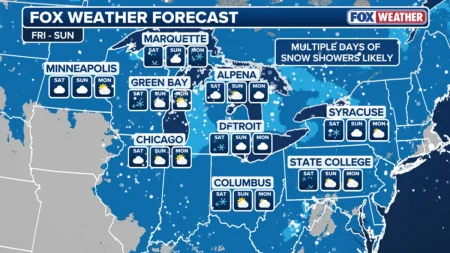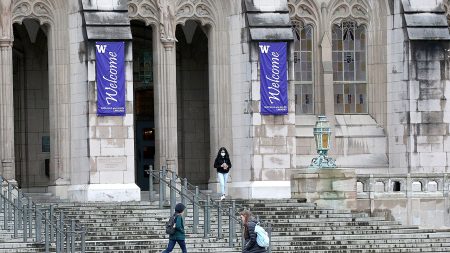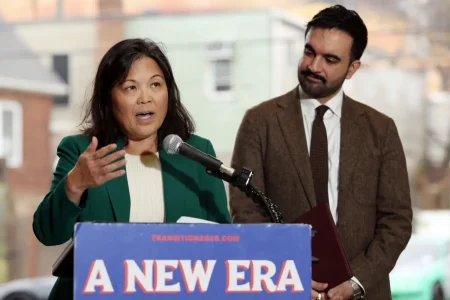After Trump’s Victory, Global Reactions Signal Seismic Shift in U.S. Foreign Policy Perceptions
International Response to U.S. Election Reveals Divided World Stage
In the immediate aftermath of Donald Trump’s return to the presidency, a statement from one conservative legislator has encapsulated the dramatic shift in global perception of America’s standing: “The Big Apple has fallen.” This stark declaration, coming from a right-wing lawmaker in a Middle Eastern nation, reflects deeper anxieties about what Trump’s victory means for the international order and regional stability. Meanwhile, across the fractured landscape of the Middle East, Palestinian communities have interpreted the election results as nothing short of a sea change in American political dynamics – a transformation they believe could significantly alter U.S. foreign policy in their region.
The phrase – evoking imagery of America’s most iconic city toppled from its pedestal – reverberates far beyond its literal meaning. It captures a sentiment spreading through diplomatic circles worldwide: that the America which presented itself as a beacon of democratic values and institutional stability has undergone a fundamental transformation. International policy experts suggest this reaction stems not merely from Trump’s victory itself, but from what many foreign observers perceive as a rejection of the post-World War II international consensus that has guided American foreign policy for generations. “What we’re witnessing is not simply a changing of the guard in Washington,” explains Dr. Eleanor Smithson, Professor of International Relations at Georgetown University. “Foreign governments are processing what appears to be a deep ideological shift in how America sees its role in the world. The ‘America First’ doctrine that defined Trump’s first term represented a fundamental challenge to decades of bipartisan foreign policy tradition.”
Middle East Perceptions Reveal Complex Expectations for American Leadership
The Middle Eastern reaction to Trump’s election victory reveals particularly complex dynamics at play across this volatile region. In nations where U.S. military presence, diplomatic initiatives, and economic partnerships have long defined security arrangements, Trump’s promise to reduce American entanglements abroad generates both anxiety and anticipation. Conservative lawmakers in countries allied with the United States express concerns about potential security vacuums, while simultaneously acknowledging alignment with Trump’s strongman leadership style and traditional values messaging. “There’s a paradoxical response happening in many Middle Eastern capitals,” notes Ambassador Richard Haass, former president of the Council on Foreign Relations. “Government officials publicly congratulate the president-elect while privately strategizing how to navigate what could be a dramatic restructuring of American regional involvement.”
Perhaps most telling has been the response from Palestinian territories, where communities have characterized the election as heralding a transformational moment in American politics. This reaction might seem counterintuitive given Trump’s first-term policies, which included moving the U.S. embassy to Jerusalem and brokering the Abraham Accords that normalized relations between Israel and several Arab nations without addressing Palestinian statehood. However, experts in regional politics suggest this reaction reflects less enthusiasm for Trump himself and more a rejection of establishment foreign policy approaches that many Palestinians believe have failed to deliver meaningful progress. “What we’re hearing from Palestinian civil society is not necessarily pro-Trump sentiment, but rather a belief that disruption of the status quo might ultimately create new possibilities,” explains Dr. Maryam Al-Khawaja, Senior Fellow at the Middle East Institute. “After decades of peace processes that haven’t produced a sovereign Palestinian state, there’s a perspective that fundamental change – any change – in American policy approach could potentially break the impasse.”
Global Implications: Recalibrating Relationships with a Transformed America
Beyond the Middle East, nations across the globe are rapidly recalibrating their diplomatic, security, and economic strategies in anticipation of Trump’s return to power. European allies, having experienced the first Trump administration’s skepticism toward NATO and multilateral institutions, are particularly focused on what the election results signal about America’s commitment to transatlantic partnerships. “We’re seeing European capitals move quickly beyond shock to strategic planning,” says former NATO Secretary-General Anders Fogh Rasmussen. “The question being asked in Brussels, Berlin, and Paris is not whether Trump 2.0 will differ from established norms of American foreign policy, but rather how dramatically and in which specific domains.” This sentiment echoes across diplomatic channels worldwide, with foreign ministries analyzing campaign rhetoric for clues about potential shifts in trade relationships, security guarantees, and climate commitments.
In Asia, reactions have been similarly calibrated to regional concerns, with particular attention to Trump’s statements regarding China, North Korea, and military presence in the Pacific. Japanese officials have privately expressed concerns about potential changes to America’s security guarantee, while South Korean diplomats are analyzing what the election might mean for the delicate balance on the Korean peninsula. Meanwhile, China’s official response has been characteristically measured, though state media commentary suggests Beijing is preparing for a relationship defined by economic competition and strategic rivalry. “The geopolitical implications of this election will unfold over months and years, not days,” observes Dr. Elizabeth Chen, Director of the Asia Program at the Wilson Center. “But what’s already clear is that nations across the Indo-Pacific are preparing for an America that approaches international partnerships through a more transactional lens.”
Historical Context: Understanding America’s Evolving Global Identity
To fully comprehend the international reaction to Trump’s victory requires placing it within the broader historical arc of America’s evolving role on the world stage. Since the end of World War II, successive administrations from both parties have maintained remarkable consistency in their commitment to maintaining the liberal international order, supporting democratization, and extending American security guarantees to allies worldwide. While individual presidents have certainly shifted emphasis and strategy, the core principles guiding American foreign policy remained relatively stable – until the first Trump presidency challenged many of these fundamental assumptions. “What makes this moment so consequential in diplomatic history is that it suggests not a temporary deviation but a potential permanent shift in how America conceptualizes its global role,” explains Dr. Francis Fukuyama, senior fellow at Stanford’s Freeman Spogli Institute for International Studies. “Foreign governments are responding not just to the election of a particular leader, but to what appears to be a deeper transformation in American political identity.”
This perception of fundamental change explains why the statement “The Big Apple has fallen” resonates so powerfully in international discourse. It’s not merely political hyperbole but reflects a genuine belief among many global observers that America is undergoing a transformation that will reshape the international system. Similarly, Palestinian characterization of the election as a “sea change” speaks to expectations – whether justified or not – that established patterns in American foreign policy may be dramatically disrupted. As governments worldwide develop strategies for engaging with the incoming administration, they do so with an acute awareness that America’s understanding of its own place in the world appears to be evolving in real-time. “What we’re witnessing is not just a typical transition of power,” concludes Ambassador William Burns, president of the Carnegie Endowment for International Peace. “It’s a moment where America’s partners and adversaries alike are reassessing fundamental assumptions about the nature of American power and purpose in the 21st century world order.”











